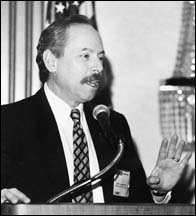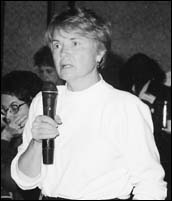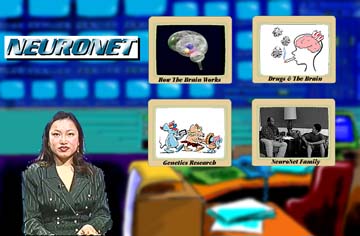 NIDA Director Dr. Alan I. Leshner in St. Louis
NIDA Director Dr. Alan I. Leshner in St. Louis A St. Louis Town Meeting community participant
A St. Louis Town Meeting community participantAs part of an expanded effort to increase public knowledge about drug abuse and addiction, NIDA has been holding a series of Town Meetings in communities across the Nation. The meetings are designed to replace common misconceptions and myths about drug abuse and addiction with scientific facts.
Last year, NIDA held Town Meetings in Miami in April; in Columbus, Ohio, in May; and in St. Louis in October. The Institute also held regional meetings in Tampa, Florida, in April and in San Francisco in December to respond to emerging issues in those areas. The Tampa meeting focused on addiction as a brain disorder and on adolescent treatment. The San Francisco meeting addressed the growing problem of methamphetamine abuse, which is currently pronounced in the western United States. This year, NIDA is holding at least three more Town Meetings. The first 1997 Town Meeting will take place in Dallas on March 24, and others are planned for Chicago on May 30 and Philadelphia in the fall.
"The Town Meetings are furthering one of NIDA's most important goals,"says NIDA Director Dr. Alan I. Leshner. "They are enabling us to communicate scientific knowledge about the actions and effects of drugs on the brain to help the public better understand the nature of addiction. And they are helping us to transfer research findings on the most effective strategies for drug abuse prevention and treatment to the community," he says.
The meetings have three specific objectives: to increase public knowledge about NIDA-sponsored research and how this research can be used to assess and address local drug abuse problems; to work with community-based organizations to increase the dissemination of available drug abuse information and materials;and to learn about local needs for additional scientific information to help shape NIDA's research agenda.
To help achieve these goals, local participants play a central role in all aspects of the meetings. A nearby major research university and theState alcohol and drug abuse agency cosponsor the meeting in partnership with community-based organizations or coalitions working to address drug abuse in the community. These local participants help shape the meetings'agendas to respond to community needs and interests, aid NIDA in informing their members and other interested individuals about the upcoming meetings,and organize and participate in presentations. People attending the meetings include local civic leaders, policy makers, public officials, drug abuse prevention and treatment professionals, and concerned citizens.
 The St. Louis Town Meeting featured an interactive video program called ATOD-TV. Viewers touch a video screen, shown here, to select from a menu of mini-television shows in which human and animated characters play out assorted drug abuse and addiction scenarios.
The St. Louis Town Meeting featured an interactive video program called ATOD-TV. Viewers touch a video screen, shown here, to select from a menu of mini-television shows in which human and animated characters play out assorted drug abuse and addiction scenarios.Because many Town Meeting participants have limited knowledge about drug abuse and addiction, NIDA has been working with local organizers to make the scientific information presented more understandable and interesting to a general audience. For example, the St. Louis meeting featured an interactive video program called ATOD-TV, short for Alcohol, Tobacco, and Other Drugs-TV. The program is designed to change misconceptions about drug abuse and increase scientific knowledge about drug abuse and addiction. Dr. Danny Wedding of the Missouri Institute of Mental Health (MIMH) showcased ATOD-TV's menu of mini-television programs, which viewers normally gain access to by touching a video screen to select different shows. In each TV show, human and animated characters play out assorted scenarios that illustrate different aspects of drug abuse and addiction. For example, in the hospital drama, "St.Nowhere," viewers touch the screen to activate characters in different hospital rooms, who talk about and dramatize the impact of drug addiction on their lives. Dr. Wedding developed ATOD-TV with his associate at MIMH, Dr. Joel Epstein, under a NIDA Science Education Drug Abuse Partnership Award. Because of the effectiveness of this presentation, NIDA has invited Dr. Wedding to present the program at the Dallas Town Meeting in March.
The Town Meetings held to date reflect local interests:
- In Miami, NIDA and the University of Miami cosponsored the meeting in cooperation with the Miami Coalition for a Safe and Drug-Free Community, the Florida Alcohol and Drug Abuse Association, the Red Ribbon Council, and the Up-Front Drug Information Center. More than 400 scientists and community participants exchanged information about local and national trends and patterns of drug use, the link between drug abuse and AIDS, and strategies for the prevention and treatment of drug abuse and addiction.
- In Columbus, Ohio, NIDA cosponsored the meeting with the Ohio Department of Alcohol and Drug Addiction Services. Because local organizations wanted to focus on effective approaches to preventing alcohol and drug abuse, Dr. Zili Sloboda, who heads NIDA's Division of Epidemiology and Prevention Research, presented key elements of drug abuse prevention, and a panel of NIDA researchers discussed how to apply model drug abuse prevention programs in the community.
- In St. Louis, Dr. Leshner met with 300 parents, teachers, students, and concerned citizens at a local high school, where he answered questions about a range of drug abuse prevention and addiction issues. The next day, NIDA, the Washington University School of Medicine, and the Missouri Department of Mental Health's Division of Alcohol and Drug Abuse cosponsored NIDA's Town Meeting in partnership with the National Council on Alcoholism and Drug AbuseSt. Louis Area and the Missouri Association of Community Task Forces. This meeting focused on ways to use the latest scientific research on drug abuse and addiction to assess Missouri's drug abuse problems and develop effective programs tailored to meet State and local needs.
At the conclusion of each Town Meeting, Dr. Leshner and representatives from State organizations and community-based groups discussed how drug abuse research can help community organizations and practitioners in their efforts to prevent and treat drug abuse and addiction. Community representatives also made suggestions about how NIDA research can address their needs.
"We now know from research more than we have ever known about drug abuse and addiction and how to get a handle on the problem," Dr. Leshner says. "NIDA's Town Meetings are bringing this scientific knowledge about preventing drug abuse and treating addiction to the grassroots where people can use it to make a difference in their communities," he says.
